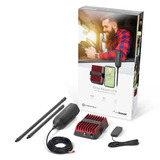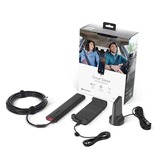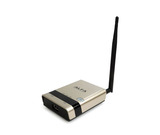An unlimited mobile phone plan is a really practical option for getting internet in your truck. Here are some reasons we think an unlimited data plan will work best for your trucking needs:
- You can stay connected almost everywhere. Most mobile carriers have widespread nationwide coverage, so you’ll experience a pretty stable connection in most places.
- They’re versatile. Mobile phones with unlimited plans can be used as hotspots, allowing you to create a Wi-Fi network in your truck. You can tether your tablet, laptop, or gaming console for off-hours entertainment.
- They’re cost-effective. While unlimited plans are slightly more expensive upfront, they usually end up saving you money. Accidentally going over your data limit on a limited plan can unnecessarily inflate your bill. If you find yourself on the road in unpredictable situations, you don’t want the dread of a data overage charge to make a stressful situation any worse.
Overall, unlimited data plans for mobile phones offer the ideal mix of flexibility for your on-the-road lifestyle, consistent in-motion connection, and expansive network coverage, all for more reasonable prices than satellite internet.
Keep in mind: Unlimited data is almost never actually unlimited. These plans give you a roomy high-speed data allotment, and your speeds will reduce after you use it up. Luckily, the slower speeds are usually still capable of handling your major needs.
So, if you can’t tell, we really recommend opting for an unlimited mobile phone plan. They’re generally a cost-effective and versatile solution for keeping a consistent internet connection during your journeys. Below are some of our favorite unlimited data plans to get you started.
MVNOs (Mobile Virtual Network Operators) are carriers that don't own cell towers but lease access to major carrier towers. If you use an MVNO cell plan, you’ll get access to the same coverage and network quality as the major carriers for cheaper prices since these companies don’t have to account for as much overhead investment.
The trade-off with MVNOs is that your mobile data will take a backseat to direct customers of the big carriers; when the network gets congested, your speed will be deprioritized so direct customers can get what they’re paying the premium price for. Popular MVNOs you’ve probably heard of include Boost Mobile, Mint Mobile, and Visible.
A cell phone booster is designed to improve your cellular signal strength in areas with poor network coverage. It works by capturing the existing weak signal outside, amplifying it, and then broadcasting the enhanced signal within a certain area, like your truck’s cabin. We recommend using one along with your mobile phone data plan to get the strongest signal and, in turn, internet connection possible.



